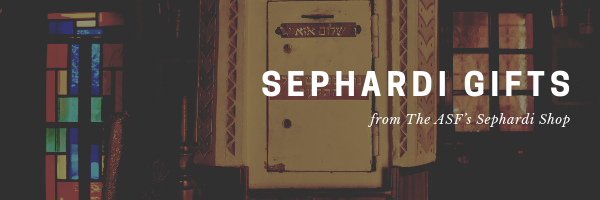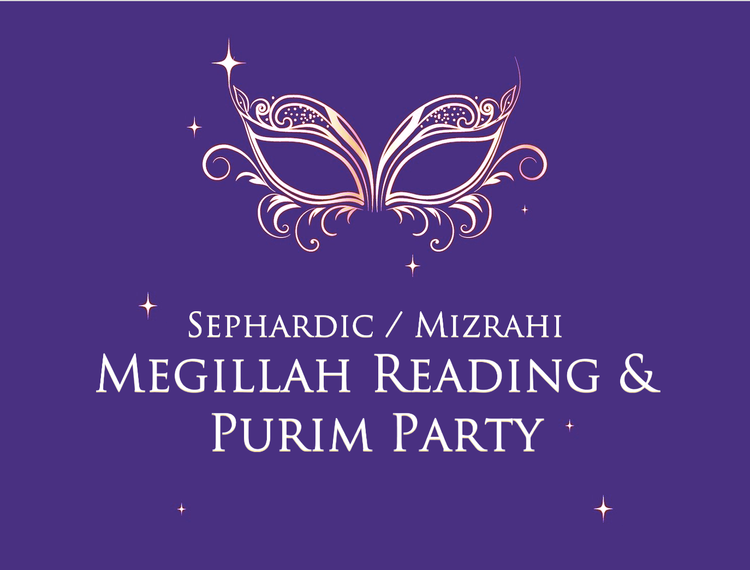In Memory of Marco Gabbai, A”H, brother of Rabbi Albert Gabbai, Minister Emeritus of Congregation Mikveh Israel, Philadelphia
Click here to dedicate a future issue in honor or memory of a loved one
Subscribe ◊ Upcoming Events ◊ ASF Sephardi Shop ◊ Donate ◊ Sephardi Ideas Monthly ◊ ASF IJE ◊ ASF Sephardi House ◊ Archive
The Sephardi World Weekly is made possible by Daniel Yifrach, Rachel Sally, Professor Rifka Cook, Maria Gabriela Borrego Medina, Rachel Amar, Deborah Arellano, & ASF VP Gwen Zuares!
Don’t miss the latest Sephardi Ideas Monthly: “Who Says Zionists Can’t Make Jazz? A Sephardi-Parisian Perspective”
“Discovering Arabic music, harnessing Jewish piyutim”
By Basia Monka, The Jerusalem Post
Ziv Yehezkel, Royal Theatre, Rabat, Morocco, 2022
(Montage courtesy of The Jerusalem Post/Jaffa Theatre)
Within Israeli society, Jewish religious institutions often function as a kind of ‘nature reserve’ for diaspora Jewish cultures that have been marginalized within the country. Take, for example, the world of North African and Middle Eastern Jewish piyutim based upon Arabic musical modes.
Ziv Yehezkel is one of Israel’s leading young paytanim, a “cantor” and singer of liturgical (soul) music who first discovered piyutim and their accompanying Arabic musical vocabulary in a Sephardi Yeshiva:
Ziv Yehezkel… discovered Arabic music at age 16. Studying at a Sephardi yeshiva in Jerusalem, which he called “a shelter for Arabic music,” he learned about the melodies hidden behind piyutim, Jewish religious poems.
In addition to his discovery of Arab melodic and harmonic worlds, “There, in the corridors of his dormitory, he heard the traditional oud for the first time. This changed his life path forever.”
As Yehezkel tells the story, cultural receptivity that is directed to God is central to the world of Sephardi piyutim:
Arabic music has found a very safe shelter in Sephardi yeshivas. Most of the piyutim are based on music of composers from Egypt, Syria, Lebanon, and other Arab countries. This is literally Arabic music, used by paytanim, who changed the words. They were writing in Hebrew about Shabbat, about God, using these melodies.
FEATURE: “The Israeli Prince of Tarab: Ziv Yehezkel”
Ziv Yehezkel
(Cover image courtesy of Dor Zlekha Levy)
“Tarab” is an Arabic term that refers to an ecstatic, mystical feeling conjured by master artists that is shared by the artist and the deep listeners in the crowd. The Israeli paytan Ziv Yehezkel is a “prince of Tarab,” previously the soloist for the Arab Orchestra of Nazareth and a contemporary expert in Arabic musical modes and the passions they communicate.
In this video, Yehezkel performs the Egyptian love song Nebtidi Minain El Hikaya(“Where Should We Begin the Tale”) by the Egyptian singer Abdel Halim Hafez.
BONUS FEATURE: “Ziv Yehezkel Singing at Your Table”
Ziv Yehezkel
(Cover image courtesy of Youtube)
Israel’s musical-cultural vitality is often felt outside of performance halls and music clubs. As it has been for many centuries, the world of Sephardi piyutim (liturgical soul music) still blossoms in liminal communal spaces, including get-togethers at private homes.
Ziv Yehezkel is one of Israel’s premier paytanim, a vocal virtuoso whose impassioned, intricate, open-hearted vocal style is balanced by a joyful rhythmic flow under disciplined control. He is a learned master of Arab musical traditions who sometimes serves as a traditional “cantor” leading communal Jewish prayer, and other times performs in television studios and in person around the world.
One of this week’s videos features Yehezkel and friends in a private home with Hevron Heights “Armagedon” Kosher Wine, pickles and watermelon arrayed on the table and delighting in Yehezkel’s elaborations and extensions of a verse from Lecha Dodi (“Let’s Go, My Beloved”), the 16th. c. Sabbath eve piyut by R’ Shlomo Alkabetz of Tzefat:
Shake yourself from the dust and arise
Put on, my people, the robes of your splendor
Through Jesse’s son, of Bethlehem:
“Draw near to my soul and redeem her.”
(Trans. Peter Cole, in The Poetry of Kabbalah)
Accompanied off-camera by an electric keyboard and a darbuka, Yehezkel, through the power of his voice and personality and to the encouragement of his compatriots, raises this informal get-together to the level of intoxicating art.
“Tunisian who sang duet with Israeli gets death threats, said fired from his job”
The Times of Israel
Tunisian composer-producer Nouman Chaari, Tunisia’s Channel 9, 15 December 2020
(Screenshot courtesy of Times of Israel)
Israeli paytan Ziv Yehezkel loves Arabic music and celebrates the Arabic dimension of Jewish musical culture. In mid-December, 2020, following the Abraham Accords, Yehezkel’s love of Arabic music led to a musical collaboration with Tunisian artist, Noomane Chaari, on the song “Peace Between Neighbors.”
The backlash, however, wasn’t long in coming. Barely a week after the song’s release, Chaari was “fired from his job at a state broadcaster and received death threats on social media.”
The intensely negative feedback that Chaari received demonstrated an unfortunately brutal fact: Yehezkel’s desire to cultivate Jewish-Arabic culture is overwhelmingly rejected in the Arab-Islamic world. Because Arabic culture is also rarely featured in the Israeli mainstream, the rich possibilities of Jewish-Arab cultural synergy will remain, for the time being, the purview of receptive, gifted and independent-minded artists like Yehezkel who discover their Arab-Jewish muse in places like an orthodox Sephardi Yeshiva.
~~~~~
Remnant of Israel a Portrait of America's First Jewish Congregation
by Hakkham Rabbi Dr. Marc D. Angel
Special Edition for the American Sephardi Federation
Published to mark Shearith Israel’s 350th anniversary, Remnant of Israel a Portrait of America’s First Jewish Congregation tells their individual stories as well as the history of the Congregation, explaining its origins, its rituals, and its traditions. It is profusely illustrated with portraits, historical documents and ritual objects. This book tells a fascinating story, one that will appeal to anyone interested in the history and culture of the Jewish People, of New York City, and of the United States.
Pizmonim: Sephardic-Hebrew Songs of the Middle East, Volume 1
By David Elihu Cohen
Pizmonim, a unity of poetry and song, have been an integral part of the Jewish People and may be traced in the Bible to the very beginning of our history.
The twelve selected Pizmonim contained in this booklet serve to perpetuate the Greater Sephardic culture and tradition of singing praise to the Lord on all joyous occasions.
~~~~~~~
Upcoming Events or Opportunities
Our friends at the LESJC in partnership with the American Sephardi Federation present:
View on a Southern Israeli Town from its Founding to October 7th
Join Dr. Aryeh Tepper live from Ofakim, a diverse Israeli “Development Town” near Gaza, for an exploration of its history, from its founding until Hamas’ invasion on 7 October as well as life today.
Sunday, 9 March 12:00PM EST
Sign-up Now!
Tickets: $10
Zoom Livestream
About the speaker:
Dr. Tepper is the Director of Publications at the American Sephardi Federation and co-Director of the Omni-American Future Project, where he is the Co-Editor of “The Omni-American Review.” He is the author of Progressive Minds, Conservative Politics: Leo Strauss’ Later Writings on Maimonides (SUNY Press, 2013) and a Fellow at at The Azrieli Center for Israel Studies at The Ben-Gurion Research Institute, Ben-Gurion University of the Negev.
~~~~~~~
Our friends at Kehila Kedosha Janina Synagogue with the American Sephardi Federation present:
Hebrew, Arabic, & Persian Calligraphy Workshop
Led by Artist and Educator Ruben Shimonov
“Learn about the history of Jewish calligraphy across the Islamic World and learn to make your very own calligraphy art!
Bukharian Jewish calligrapher Ruben Shimonov serves as the National Director of Sephardi House and Education at the American Sephardi Federation. His creations incorporate Arabic, Hebrew, and Persian, and represent his multilingual and multicultural upbringing. As an artist, Ruben uses his designs to build interfaith and inter cultural bridges, while also celebrating the diversity of the Greater Sephardic world.”
Tuesday, 11 March 7:00PM EST
@Kehila Kedosha Janina Synagogue
280 Broome St NYC
RSVP: info@GreekJewishYPN.org
Tickets: $18
*Open to Jewish young adults in their 20s and 30s
~~~~~~~
Our friends at the TriBeCa Synagogue present:
Sephardic/Mizrahi Megillah Reading and Purim Party!
A stellar team of our community members will be reading Megillat Esther in the Syrian, Moroccan, Iraqi and Yerushalmi traditions.
Following the reading in the main sanctuary, we’ll continue the celebration in the reception hall with Persian delicacies, fine wines and Shushan-inspired vibes. Costumes welcome!
Thursday, 13 March
8:15PM Megillah Reading
9:00PM Purim Party
@ the TriBeCa Synagogue
49 White St, New York City
Sign-up Now!
Tickets: $0-18
(Registration required)
The service will also be live-streamed for those joining us at a distance.
*Please note that although this event will take place at Tribeca Synagogue, the Megillah reading will be a dedicated one for and by our community, and as always, Sephardic/Mizrahi traditional (non-denominational), inclusive, and egalitarian.
~~~~~~~
Our friends at Qesher present:
A ‘Walk’ Through the Jewish History of Florence
“You are invited to a virtual ‘walk’ through the most significant places in the city where, from the Renaissance to our times, Jews in Florence have lived, worked, and shared community and religious life. This path, enriched with history, curiosity, and memories, aims to bring to life the lesser-known places of Jewish presence in the city.
The tour ends at the Great Synagogue (1882), one of the symbols of the emancipation of Italian Jews. Damaged by the Nazi-Fascists during WWII, it is still active and remains a vibrant focal point of contemporary Jewish life in Florence.”
Tuesday, 18 March at 4:00PM EST
Sign-up Now!
Tickets: $9-$18
About the speaker:
“Giovanna Bossi Rosenfeld, born in Florence, is a historian of Florentine architecture and a licensed tour guide who specializes in tours of her city from a Jewish perspective. She brings Jewish Florence's history to life through her knowledge, stories, and memories, as well as by taking you to the very places where Jewish history was made and continues to thrive, thanks to an active Jewish community. She is a co-author of the book Jewish Florence: Illustrated Itinerary (Florence, ASKA Editor, 2019).”
~~~~~~~
Our friends at Qesher present:
The Jews of the Greek Islands: Crete, Rhodes and Corfu
Sunday, 23 March at 4:00PM EST
Sign-up Now!
Tickets: $9-$18
About the talk:
“Since ancient times, many of the thousands of sunny and breath-taking islands dotting the eastern Mediterranean Sea have served as a home for Diaspora Jews.
In this lecture, we will explore the fascinating and lesser-known history and traditions of three of the most famous such islands situated in modern-day Greece: Crete, the largest Greek island with its ancient Romaniote Jewish community; Rhodes, a Sephardic microcosm in the Aegean Sea; and Corfu, with its prolific Italian Jewish community in the Ionian Sea.
These historic and diverse communities enrich our understanding of the Jewish Diaspora and its remarkable saga of survival.”
About the speaker:
“Joseph Michael Vardakis was born in Athens, Greece. He has a B.A in Psychology, an M.A in Psychobiology and is currently completing his M.Sc in Clinical Psychology. He has lived and studied in the UK, South Africa and Israel and is currently residing in Athens. He has been a student counsellor for the Ministry of Absorption for new immigrants to Israel and has also worked in an educational framework for the Jewish community in South Africa before his studies. On his spare time, he offers themed tours in Athens, including sites of Jewish interest.”










